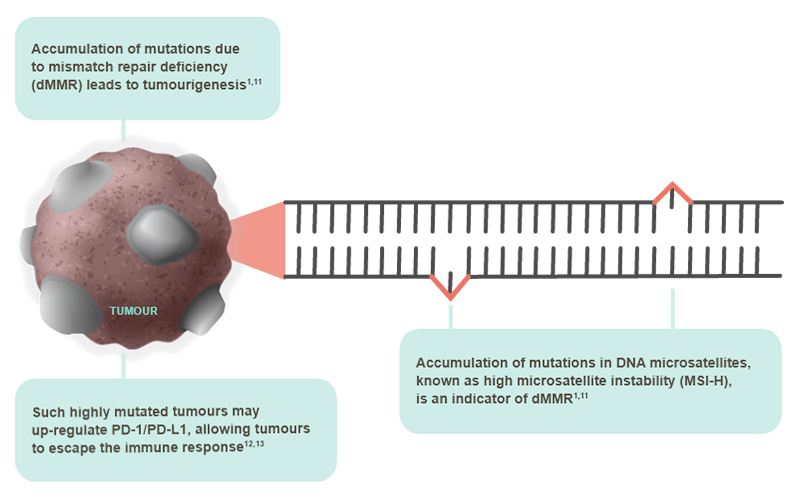MMR/MSI:
Predictive value in recurrent/advanced endometrial cancer (EC)
MMR/MSI status has a role in immunotherapies for the treatment of recurrent/advanced EC. These biomarkers have predictive value in guiding treatment decisions for patients facing a poor prognosis and limited treatment options.1-6

ENDOMETRIAL CANCER HAS THE HIGHEST RATE (~30%) OF dMMR/MSI-H TUMOURS AMONG CANCER TYPES7-9
MMR/MSI and the treatment of recurrent/advanced EC
Mismatch repair proteins participate in correction of spontaneous errors that occur during DNA replication.10

PD-1/PD-L1 inhibitors restore immune response12
MMR/MSI TESTING CAN IDENTIFY TUMOURS THAT MAY RESPOND TO IMMUNOTHERAPY1
It’s time to test
Given that EC has the highest rate of dMMR/MSI-H across cancer types, test for dMMR/MSI-H to enable new treatment options in recurrent/advanced EC.1
Abbreviations
dMMR=mismatch repair deficient; MMR=mismatch repair; MSI=microsatellite instability; MSI-H=microsatellite instability-high; PD-1=programmed death receptor-1; PD-L1=programmed death ligand 1.
References
- Luchini C, Bibeau F, Ligtenberg MJL, et al. ESMO recommendations on microsatellite instability testing for immunotherapy in cancer, and its relationship with PD-1/PD-L1 expression and tumour mutational burden: a systematic review-based approach. Ann Oncol. 2019;30(8):1232-1243.
- Morice P, Leary A, Creutzberg C, Abu-Rustum N, Darai E. Endometrial Cancer. Lancet. 2016;387(10023):1094-1108.
- Huijgens ANJ, Mertens HJMM. Factors predicting recurrent endometrial cancer. Facts Views Vis Obgyn. 2013;5(3):179-186.
- Ueda SM, Kapp DS, Cheung MK, et al. Trends in demographic and clinical characteristics in women diagnosed with corpus cancer and their potential impact on the increasing number of deaths. Am J Obstet Gynecol. 2008;218:e1-e6.
- Colombo N, Creutzberg C, Amant F; & the ESMO-ESGO-ESTRO Endometrial Consensus Conference Working Group. ESMO-ESGO-ESTRO Consensus Conference on Endometrial Cancer: diagnosis, treatment and follow-up. Ann Oncol. 2016;27(1):16-41.
- Colombo N, Preti E, Carinelli S, et al. on behalf of the ESMO guidelines Working Group. Endometrial cancer: ESMO Clinical Practice Guidelines for diagnosis, treatment and follow-up. Ann Oncol. 2013;24(suppl6):33-38.
- Le DT, Durham JN, Smith KN, et al. Mismatch repair deficiency predicts response of solid tumors to PD-1 blockade. Science. 2017;357(6349):409-413.
- Makker V, Green AK, Wenham RM, Mutch D, Davidson B, Miller DS. New therapies for advanced, recurrent, and metastatic endometrial cancers. Gynecol Oncol Res Pract. 2017;4(19):1-12.
- The Cancer Genome Atlas Research Network. Integrated genomic characterization of endometrial carcinoma. Nature. 2013;497(7447):67-73.
- Pećina-Šlaus N, Kafka A, Salamon I, Bukovac A. Mismatch repair pathway, genome stability and cancer. Front Mol Biosci. 2020;7(122):1-12.
- Le DT, Uram JN, Wang H, et al. PD-1 blockade in tumors with mismatch-repair deficiency. N Engl J Med. 2015;372(26):2509-2520.
- Dudley JC, Lin M-T, Le DT, Eshleman JR. Microsatellite instability as a biomarker for PD-1 blockade. Clin Cancer Res. 2016;22(4):813-820.
- Howitt BE, Shukla SA, Sholl LM, et al. Association of polymerase e-mutated and microsatellite-instable endometrial cancers with neoantigen load, number of tumor-infiltrating lymphocytes, and expression of PD-1 and PD-L1. JAMA Oncol. 2015;1(9):1319-1323.
Senast uppdaterad: Augusti 2025. NP-SE-DST-WCNT-220006




